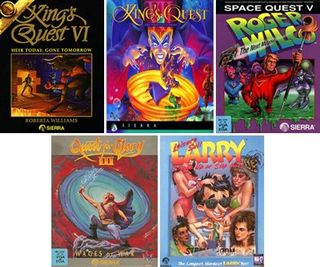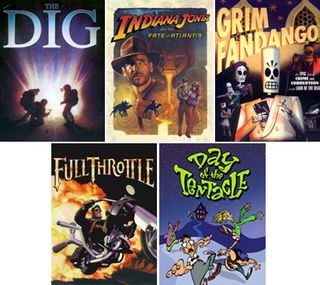As we move onward to the mid-nineties, the adventure genre truly blossomed. The days of text parsers and frustrations with guessing the right verb or noun were history. Sierra’s love affair with sequels continued to flourish with follow-ups to its most popular franchises, including King’s Quest VI, King’s Quest VII, Quest for Glory III, Police Quest IV, Space Quest V, Space Quest 6, and Leisure Suit Larry 6.

Above: Before PC gamers ended their long love affair with adventure games in exchange for FPSes and RTSes, Sierra got to work pumping out the sequels
During this time period, LucasArts released a few excellent sequels as well, like Indiana Jones and the Fate of Atlantis and Maniac Mansion: Day of the Tentacle. But unlike Sierra, LucasArts seemed less focused on riding the sequel train, releasing tons of highly polished and unforgettable masterpieces like Sam & Max Hit the Road, Full Throttle, The Dig, and Grim Fandango.
The pattern seems clear. Every year, Sierra releases a ton of sequels, keeping fans of its popular series busy with lots of new adventures to point-and-click through. And every year, Lucasfilm Games/LucasArts releases one or two utterly amazing titles that blow the pants off anything we’d seen before. But with so many great games from both camps, is it fair to label this showdown as a matter of quality versus quantity? During these last sweet years of the genre’s highpoint, Sierra had also released a number of great original adventures, with brand new characters and premises. GamesRadar’s Charlie Barratt’s lifelong love affair with the Gabriel Knight series and his boyhood crush on Grace Nakimura (the snarky librarian from the game) are testament to this. But other originals like Freddy Pharkas: Frontier Pharmacist, and Phantasmagoria also come to mind.

Above: For us, the mid-nineties marked the highpoint for the adventure genre, with the most memorable titles coming from LucasArts
So how can we possibly decide which company made the best adventures? If it comes down to the sheer number of quality games released, Sierra wins hands down. But if we wind up going for the company that released the most games that we’d re-install and play again years later, our heart tells us to damn Charlie Barratt and his beloved Gabriel Knight to hell, forcing us to go with LucasArts for their Monkey Island series, Day of the Tentacle, and Grim Fandango. If we try to look at what fans of both camps have done on their own since then, you’ll find tons of fan-made sequels and spin-offs paying homage to both Sierra and LucasArts games. Eventually, we thought we’d try flipping a coin to see who would win this match with Sierra as heads and LucasArts as tails. Unfortunately, in defiance of the laws of physics, the coin ended up landing on its edge at a perfect ninety-degree angle every time. We even tried googling ‘Sierra versus LucasArts,’ but then all we found were a few forum threads and part one of this very article.
In the end, we decided to settle this once and for all by consulting our gut, the place where we’ve sent fast food meals, instant ramen, and cups of coffee to fuel our all night gaming sessions. And guess what? Our gut says that LucasArts definitely made the best adventures. It was Lucasfilm Games that first tackled some of the fundamental difficulties with the gameplay of graphical text adventures with the “slot machine” mechanic with its Labyrinth game. It was Lucasfilm Games who first moved the genre forward into the typing-free world of purely point-and-click adventures with its SCUMM engine. And it was LucasArts who gave gamers the most iconic protagonists from the golden age of adventures. Gabriel Knight and King Graham be damned. So long, and thanks for all the evidence Sonny Bonds. We got laid in real life (no thanks to you), Larry. Long live Guybrush Threepwood, evil tentacles, Indiana Jones, Sam & Max, and the Polecats. If we have to choose just one, we choose you, LucasArts.
May 26, 2009


Our journey through the golden age of adventure games begins

Ridiculous riddles that defy logic, common sense, and patience

